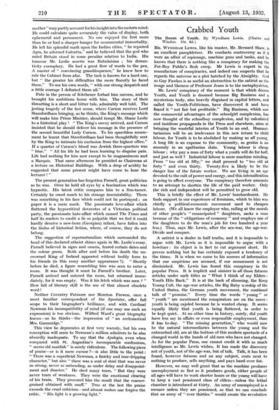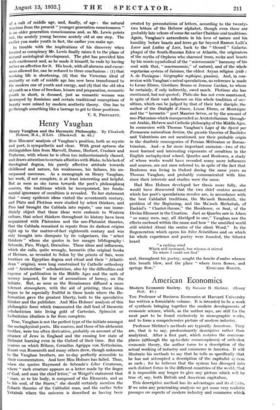Crabbed Youth
MB.. WYNDHAM LEWIS, like his master, Mr. Bernard Shaw, is an excellent pamphleteer. He conducts controversy as if it
were an affair of espionage, machine guns and tanks, and he knows that there is nothing like a conspiracy for making the Fat-Boy Public's flesh creep. Mr Lewis is expert in the manufacture of conspiracies, and indeed one suspects that he regards the universe as a plot hatched by the Almighty. God as Guy Fawkes is as useful an abstraction to the satirist as the image and likeness of Professor Jeans is to the metaphysician.
Mr. Lewis' conspiracy of the moment is that which dooms Youth, and Youth is doomed because Big Business and a mysterious body, also heavily disguised in capital letters, and called the Youth-Politicians, have discovered .it and have found it " not fair but profitable." Big Business, which saw the commercial advantages of the schoolgirl complexion, has now thought of the schoolboy complexion, and by calculated and insidious propaganda in the Press and elsewhere, aims at bringing the wasteful interim of Youth to an end. Humani- tarianism will be an irrelevance in this new return to child labour, for Youth is to be abolished by making us all young. A long life is an expense to the community, as genius is an anomaly in an egalitarian slate. Young labour is cheap labour ; why pay a man of forty what a youth will dolor half, and just as well ? Industrial labour is mere machine minding. From " too old at fifty," we shall proceed to " too old at forty " and even thirty. Tvienty-five is likely to be the danger line of the future worker. We are living in an age devoted to the cult of power and energy, and this intensification is going to affect everyone. The conspiracy therefore amounts to an attempt to shorten the life of the paid worker. Only the rich and independent will be permitted to grow old.
This is briefly the effect of Mr. Lewis' bombardment. He finds support in our experience of feminism, which to him was chiefly a political-economic movement used to cheapen labour. (We all know the employer who, railing at the morals of other people's " emancipated " daughters, sacks a man because of the " obligations of economy " and employs one of the daughters to do the man's job for two hundred a year less.) Thus, says Mr. Lewis, after the sex-war, the age-war. Divide and conquer.
A satirist is a dealer in half truths, and it is impossible to argue with Mr. Lewis as it is impossible to argue with a howitzer : its object is in fact to cut argument short. He proves nothing but he has certainly exposed a tendency of the times. It is when we come to his sources of information that our suspicions are aroused, if our amusement is not diminished. Mr. Lewis has found this conspiracy in the popular Press. It is implicit and sinister in all those fatuous articles under such titles as " What I think of my Elders : Youth Hits Back." It is at the back of slimming, the Keep Young Cult, the age-war articles, the Big Baby worship of the United States, the German youth movement, the continual talk of " promise." Every time the words " young " or " youth " are mentioned the conspirators are on the move : youth is being cajoled because he is wanted cheap. It seems equally likely that youth is being flattered, in order to be kept quiet. At no other time in history, surely, did youth have less say in affairs or even responsible employment, than it has to-day. " The missing generation," who would now be the natural intermediaries between the young and the entrenched old, are at the bottom of this modern spectacle of a changed -world in the hands of old men who have not changed. As for the popular Press, one cannot credit it with as much intelligence as Mr. Lewis wishes. It has made the discovery not of youth, not of the age-war, but of talk. Talka it has been found, however fatuous and on any subject, costs next to nothing to produce, sells anything, and pays hand over fist.
However, we may well grant that as the machine produces unemployment as fast as it produces goods, either people of all ages will have to work shorter hours or the young will have to keep a vast pensioned class of elders—unless the lethal chamber is introduced at thirty. An army of unemployed is a menace unless they are pensioned, so that we can conclude that an army of " over thirties " would create the revolution of a cult of middle age, and, finally, of age : the natural reaction from the present " younger generation consciousness " is an older generation consciousness and, as Mr. Lewis points out, the acutely young become acutely old at one step. The earlier you make youth in fact, the earlier you make age.
In trouble with the implications of his discovery when treated as conspiracy Mr. Lewis finally raises it to the plane of natural sociological development. The plot has provided him with excitement and, as he made it himself, he ends by having rather an affection for it. His book, with all alarums and excur- sions allowed for, can be reduced to three conclusions : (1) that working life is shortening, (2) that the Victorian ideal of maturity or cult of middle .age has now been transformed to the modern one of youth and energy, and (8) that the old idea of youth as a time of freedom, leisure and preparation, romantic youth in short, is doomed, just as romantic woman was destroyed by feminism and certain traditional conceptions of beauty were mined by modern aesthetic theory. One has to go through something like a barrage to get to these positions.
V. S. PRITCHETT.































 Previous page
Previous page